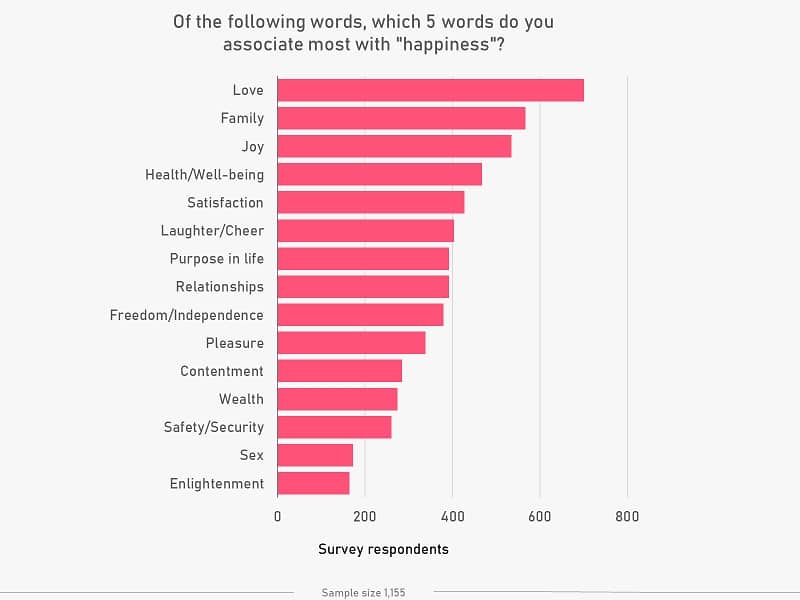If you were asked to describe what happiness means to you without actually using the word “happiness”, what would you answer? We asked this question to over a thousand people and recorded the answers. As a result, we found a number of striking contrasts between different demographic groups.
Our results include:
- “Love” is most associated with the word “Happiness”, according to our 1,155 respondents.
- Happy people are 55% more likely to associate the words “Happiness” and “Family” with each other than unhappy people.
- Men are 250% more likely to associate sex with happiness than women are.
- Married people are 19% more likely to associate “Love” with “Happiness” than unmarried people.
- >30-year-old people are 24% less likely to associate the words “Sex” and “Happiness” with each other.
- By having kids, we’re 25% less likely to associate “Freedom and independence” with “Happiness”.
This study provides clear differences in how people define happiness, which is something that hasn’t been done before.
This article covers the data that was collected and explores the many word associations between different demographic groups. What words do people associate most with happiness?
It’s time to share what we discovered.
What does happiness mean? This is one of those questions that always get a different answer, no matter how many people you ask. We surveyed over a thousand people and tried to find as many answers as possible.
We wanted to know how people would describe happiness without being able to actually use the word “Happiness”.
What words do you associate most with happiness?
We asked 1,155 respondents the following question:
Of the following words, which 5 words do you associate most with “happiness”?
Each respondent had to pick 5 words that they felt most associated with the word happiness:
- Laughter/Cheer
- Joy
- Pleasure
- Satisfaction
- Contentment
- Safety/Security
- Purpose in life
- Love
- Relationships
- Family
- Wealth
- Freedom/Independence
- Health/Well-being
- Sex
- Enlightenment
- Other
The words appeared in random order. In total, this resulted in 5.775 answers.
This chart shows how often each word was associated with the word happiness.
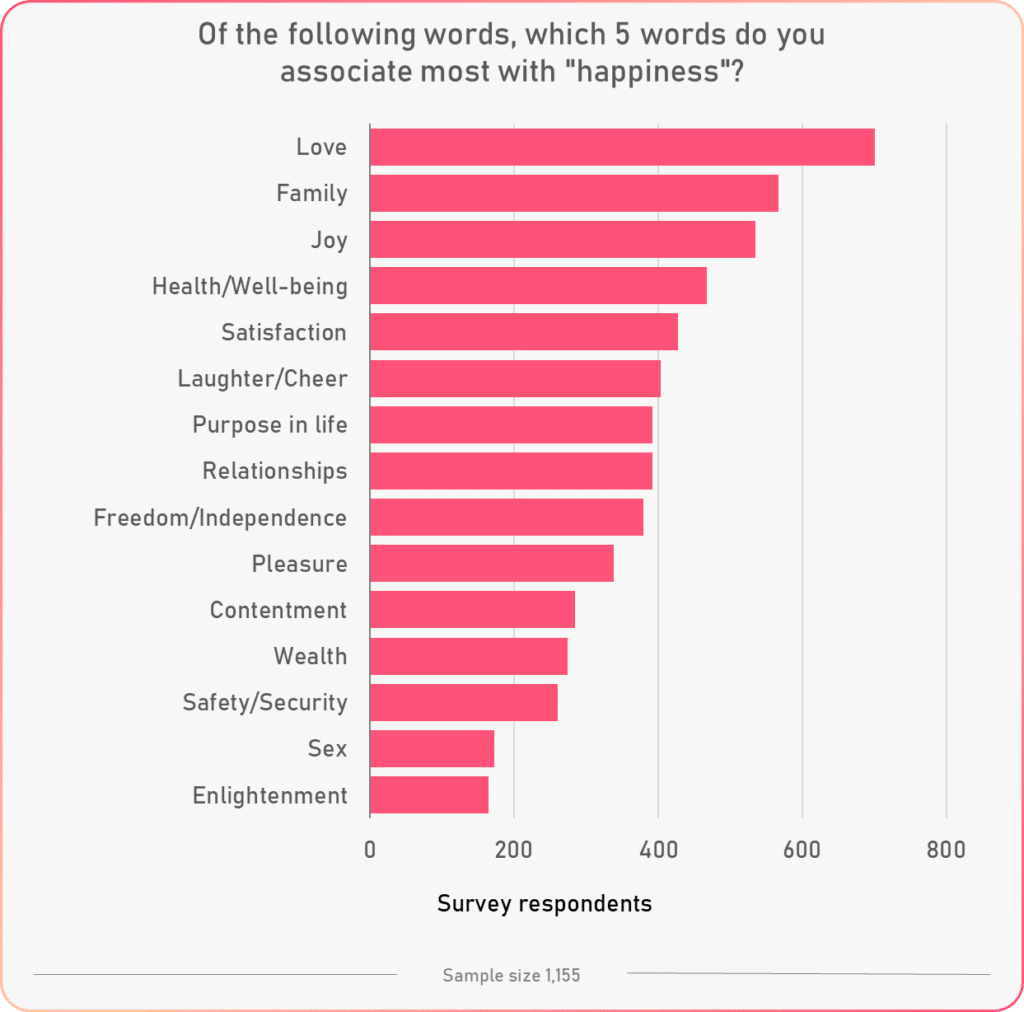
Love, family, joy, health & well-being and satisfaction are most often associated with happiness.
Our study shows that the word “Love” is most associated with the word “Happiness”.
But how does this data correlate to different demographic characteristics? To find out, we asked each respondent a number of additional questions, ranging from overall happiness rating to marital status. How did these demographics affect order of most associated words to happiness?
Happy people versus unhappy people
We asked the respondents the following question about their happiness:
If you look back at the last year of your life, how would you rate your happiness on a scale from 1 to 10?
We then grouped all respondents based on their answers.
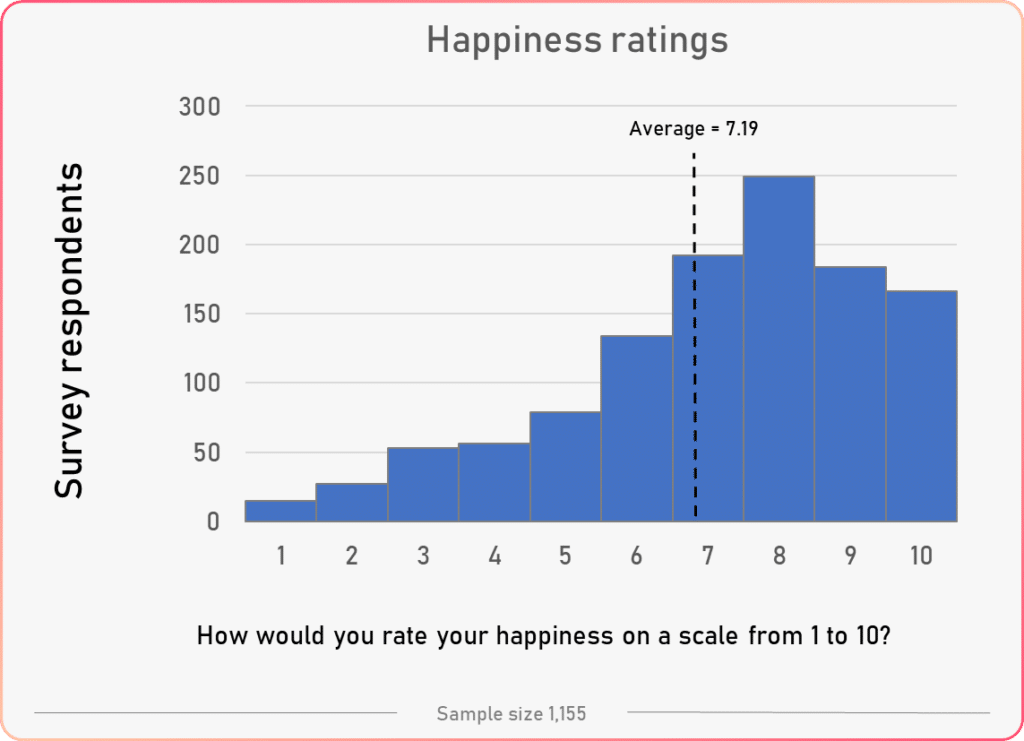
The average happiness rating from all respondents was 7.19.
We then divided the respondents in 3 roughly equally-sized groups:
- Relatively unhappy people (happiness 6 or lower): n=364
- People with average happiness (happiness of 7 or 8): n=441
- Relatively happy people (happiness higher than 8): n=350
By comparing the 350 happiest people to the 364 unhappiest people in our survey, we found a number of interesting and significant differences.
Happy people associate “Sex” with “Happiness” more often
Out of the 173 respondents that placed sex in their top 5 words associated with happiness, 61 were part of the relatively happy group. In comparison, only 40 of the people that are relatively unhappy placed sex in their top 5 words.
When looking at the data compared to the number of respondents of each group, the following observation can be made:
- Of all happy respondents, 17.4% used the word “Sex” as a word to associate with “Happiness”.
- Of all unhappy respondents, 11.0% used the word “Sex” as a word to associate with “Happiness”.
Happy people are 59% more likely to associate “Sex” with “Happiness” than unhappy people.
This is visualized in the chart below, where happy respondents showed a likelihood 59% times bigger than those that are unhappy.
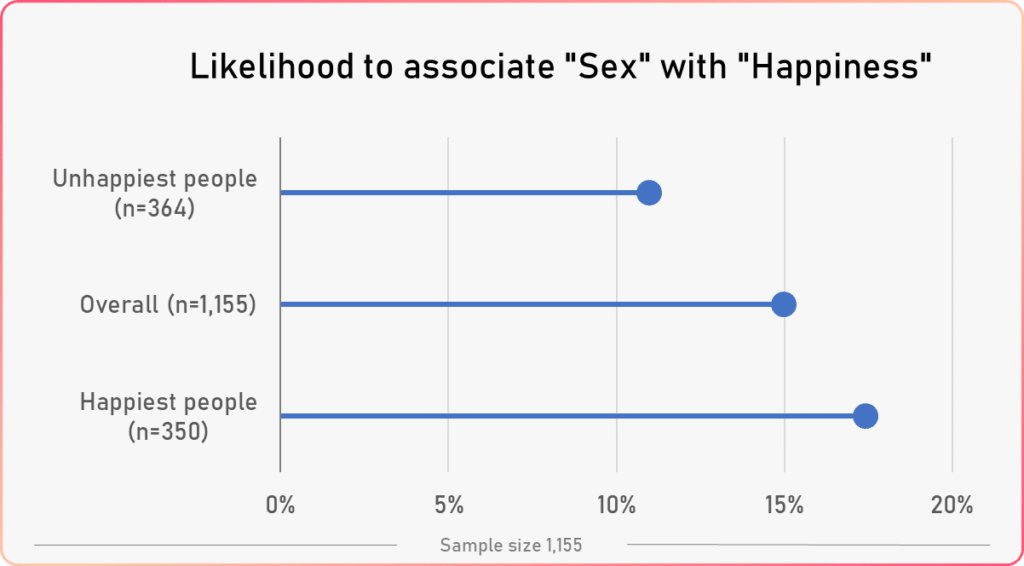
It has been proven by many other studies that sex is correlated to happiness.
- This study reports that sex increases our positive moods.
- Here’s one that shows that couples who have weekly sex are the happiest.
- Another study that shows both a higher quantity and higher quality of sex is correlated to increased well-being.
- And many more.
It’s interesting to see that this correlation aligns with our word association study.
Happy people more likely to associate “Family” with “Happiness”
We found another interesting difference between the unhappy and happy group of respondents.
Of all happy respondents, 61.7% used the word “Family” as a word to associate with “Happiness”. On the other hand, only 39.8% of the unhappy respondents made the association between the words “Family” and “Happiness”.
Happy people are 55% more likely to associate the words “Happiness” and “Family” with each other.
This difference is visualized in the chart below.
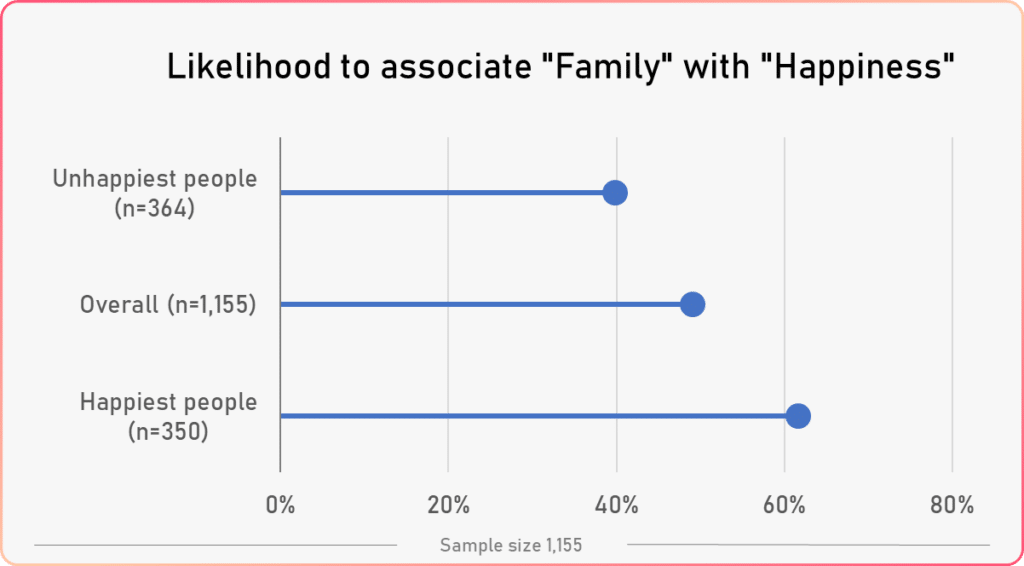
This is another interesting result. A good family-life can provide a lot of happiness in our lives, in addition to support, laughter, safety and love. It’s clear that happier people are more likely to acknowledge the importance of family.
While this doesn’t provide any information as to how family and happiness are related, there are many other studies that have proven how happiness and family are correlated.
Happy people associate “Wealth” with “Happiness” more frequently
An often studied field in mental health is the influence that money has on happiness. We found that happiness was associated with wealth more by the group of happy people.
32.0% of the happy respondents used the word “Wealth” as a word to associate with “Happiness”. On the other hand, only 18.1% of the unhappy respondents made the association between the words “Wealth” and “Happiness”.
Happy people are 76% more likely to associate “Wealth” with “Happiness”.
This difference is visualized in the chart below.
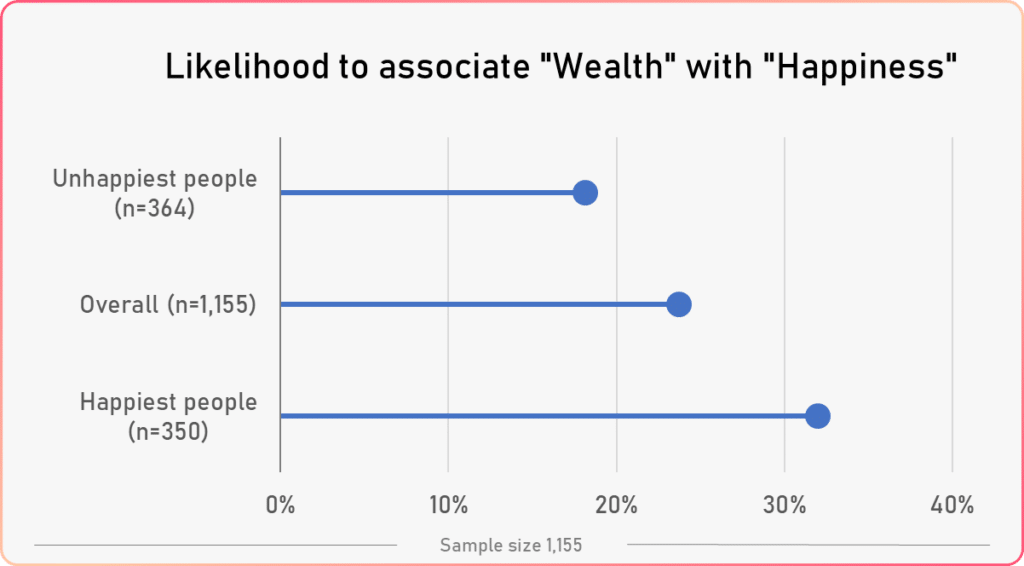
A lot of studies have proven that money does indeed “buy happiness”, including this recent one. This is in line with our findings, as people that are happy are more likely to experience the positive benefits of being wealthy.
Men versus women
The difference between men and women has been studied for centuries, resulting in objective differences in the way men and women experience emotions, hormonal changes and expressivity.
Out of our 1,155 respondents, 665 were male, and 482 were female.
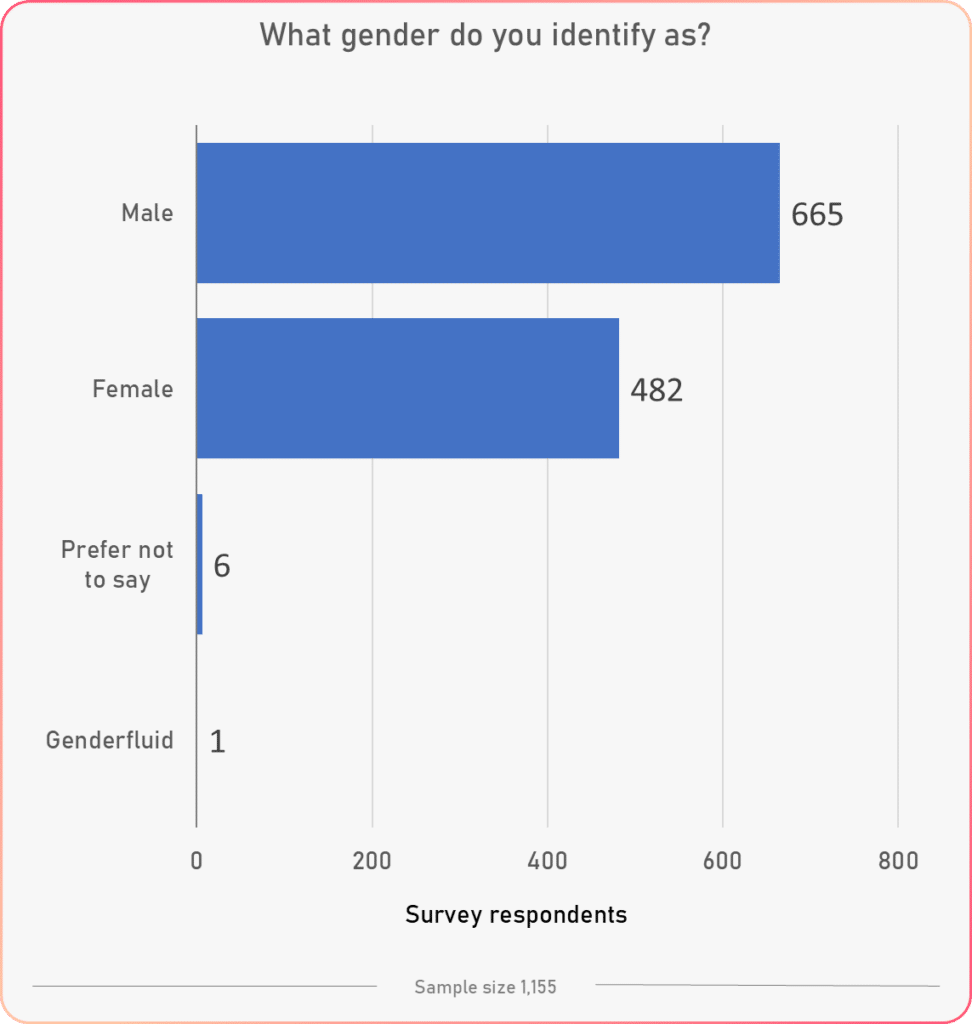
Top 5 most associated words with happiness same for men and women
We were surprised to see little differences between men and women when it comes to associating different words to “Happiness”.
For both men and women, the 5 most associated words with “Happiness” remain the same.
However, one outlier was the word “Sex”.
Happiness and sex and the difference between men and women
In total, the word sex was associated with the word happiness 173 times. This means that 173 out of our 1,155 respondents (15%) placed sex in their top 5 words that are most associated with the word happiness.
Out of the 173 respondents that placed sex in their top 5 words associated with happiness, 134 were male. In comparison, only 38 females placed sex in their top 5 words.
Men are 250% more likely to associate sex with happiness than women are, according to our study.
This is visualized in the chart below.
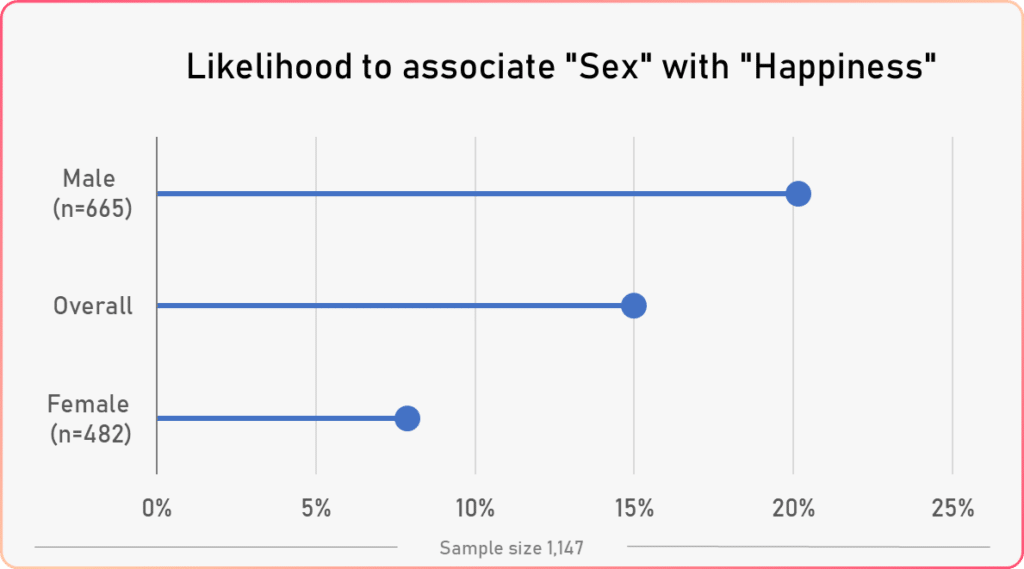
A study suggested by Psychology Today noted women are less likely to orgasm during sex, which could explain the rift between both genders. That survey queried 24,000 college-aged women and revealed that 40% of them climax during sex while 80% of their male counterparts did. This could explain the large difference between men and women when it comes to associating happiness with sex.
The impact of aging
We asked our respondents their approximate age.
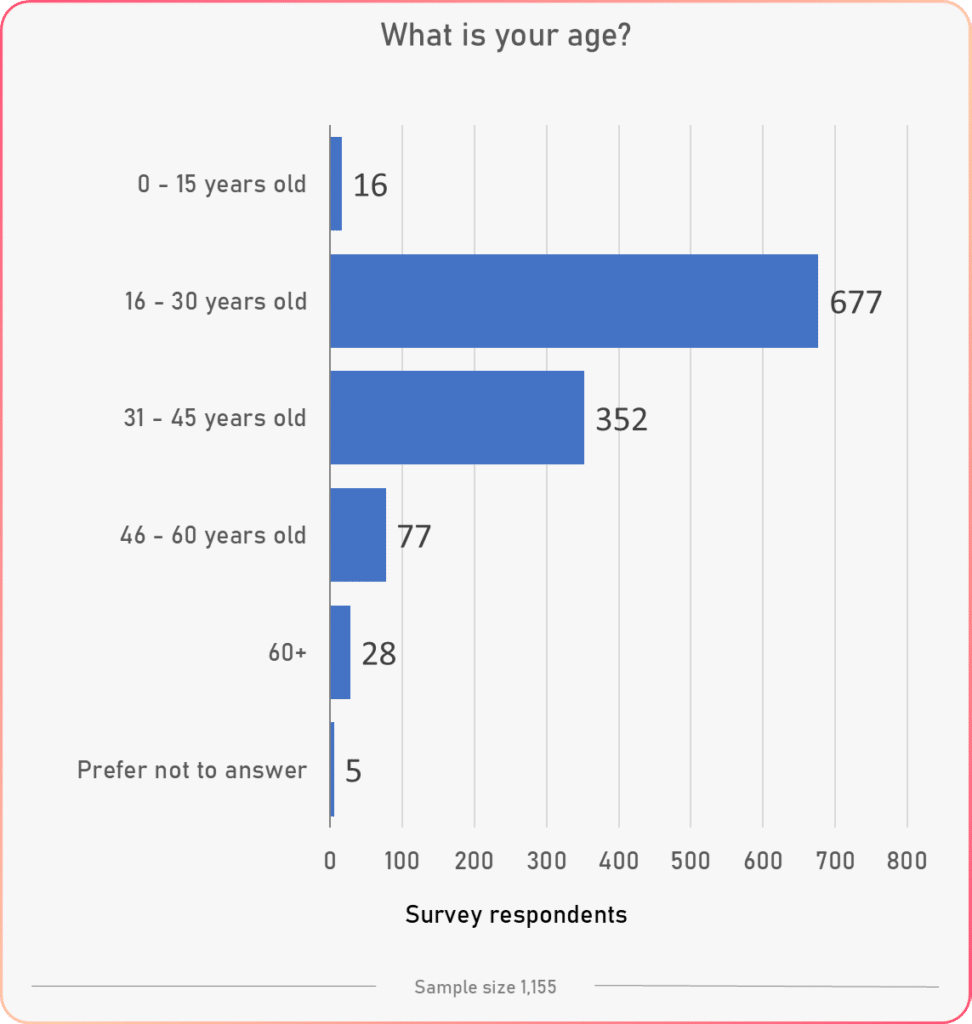
Since the majority of our respondents was aged between 16-30 years old, we divided the respondents into two groups:
- People of 30 years or younger: n=693
- People older than 30 years: n=457
By comparing these groups with eacher other, we were able to make some interesting observations again.
People above 30 associate “Sex” less with “Happiness”
Of the respondents that were younger than 30 years, 16.6% associated the words “Sex” and “Happiness” with each other. On the other hand, only 12.7% of the respondents above 30 years old made the same word association.
>30-year-old people are 24% less likely to associate the words “Sex” and “Happiness” with each other.
This difference is visualized in the chart below.
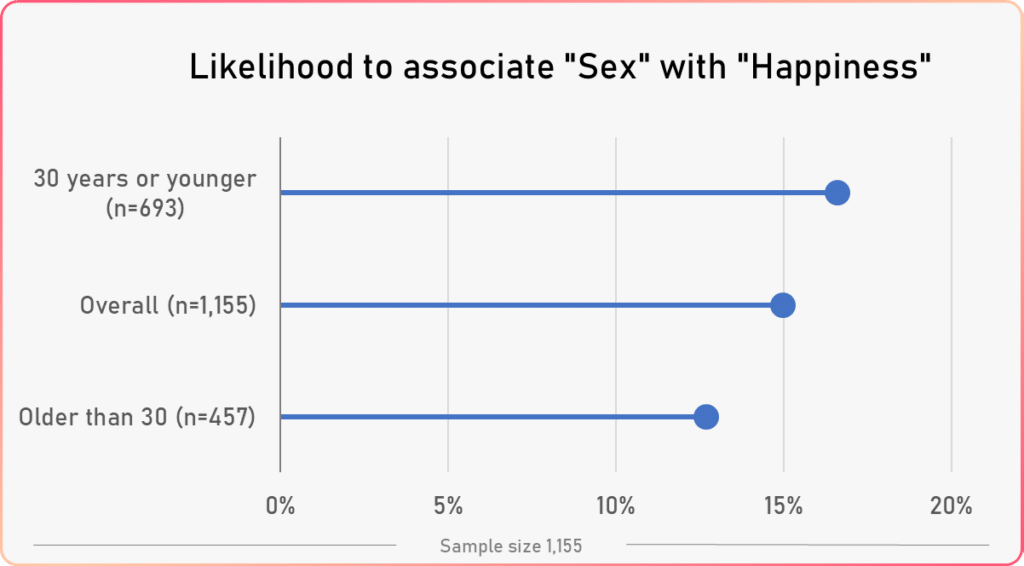
This difference is likely explained by the human libido, and how it changes as we age.
People above 30 associate “Health” more with “Happiness”
We are all slowly dying. That is to say that our bodies are slowly but constantly deteriorating as we grow older. Therefore, we were expecting age to have some influence on the association between the words “Health” and “Happiness”.
Of the respondents that were older than 30 years, 48.4% associated the words “Health/Well-being” and “Happiness” with each other. On the other hand, only 35.2% of the respondents younger than 30 years old made the same word association.
>30-year-old people are 37% more likely to associate the words “Health” and “Happiness” with each other.
This difference is visualized in the chart below.
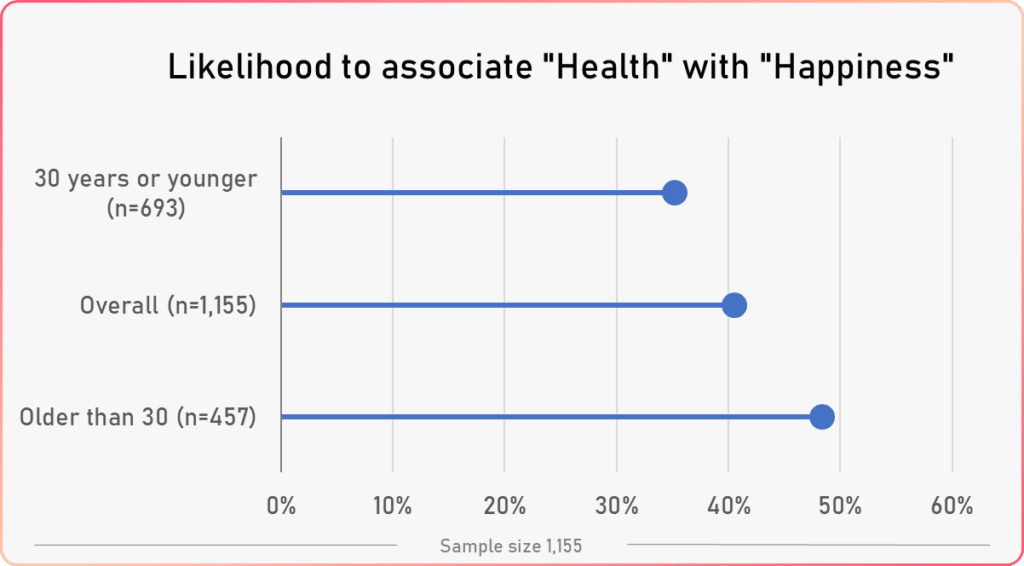
This suggests that the impact of our health on our happiness grows as we get older. Typically, a person experiences more health issues at an older age. Therefore, it’s unsurprising to see a stronger association between health and happiness in the responses of older people.
Does marital status impact our definition of happiness?
Whenever a couple announces a recent proposal, there’s often someone that jokingly gives the couple condolences instead of the usual congratulations. This implies that a married life consists of restrictions and stress as opposed to sex, love and happiness.
We asked our respondents whether or not they were married, in order to find out how their definition of happiness changed after their marriage.
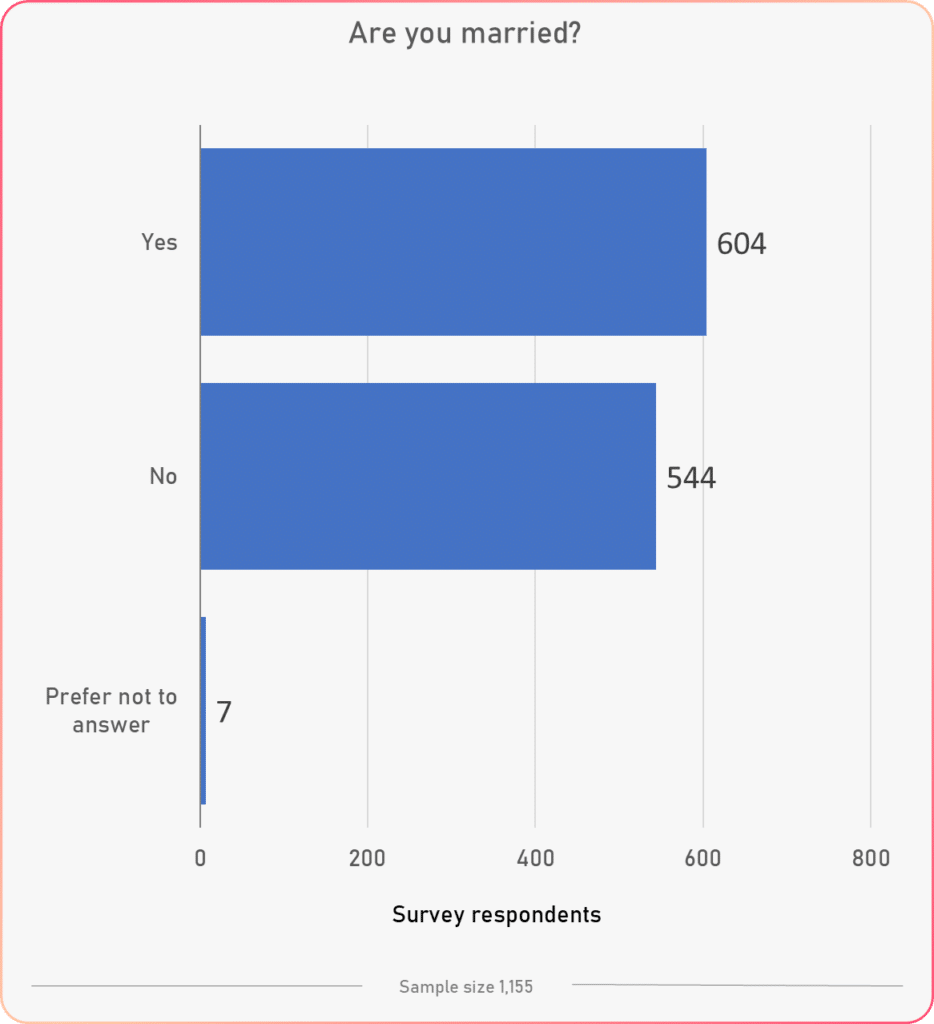
604 respondents were married at the time of the survey, whereas 544 were unmarried. Unsurprisingly, there were some striking differences between these two groups.
The positive effects of marriage on our happiness
As said before, marriage is often jokingly refered to as a surefire way to end your sexlife. While our study does not indicate whether or not married couples are less likely to have sex, it does show an interesting change.
Married respondents are more likely to associate “Love” and “Sex” with the word “Happiness”.
Of the 604 married respondents, 65.4% associated the words “Love” and “Happiness” with each other. Only 55.1% of the unmarried respondents made the same word association.
Married people are 19% more likely to associate “Love” with “Happiness” than unmarried people.
This difference is visualized in the chart below.
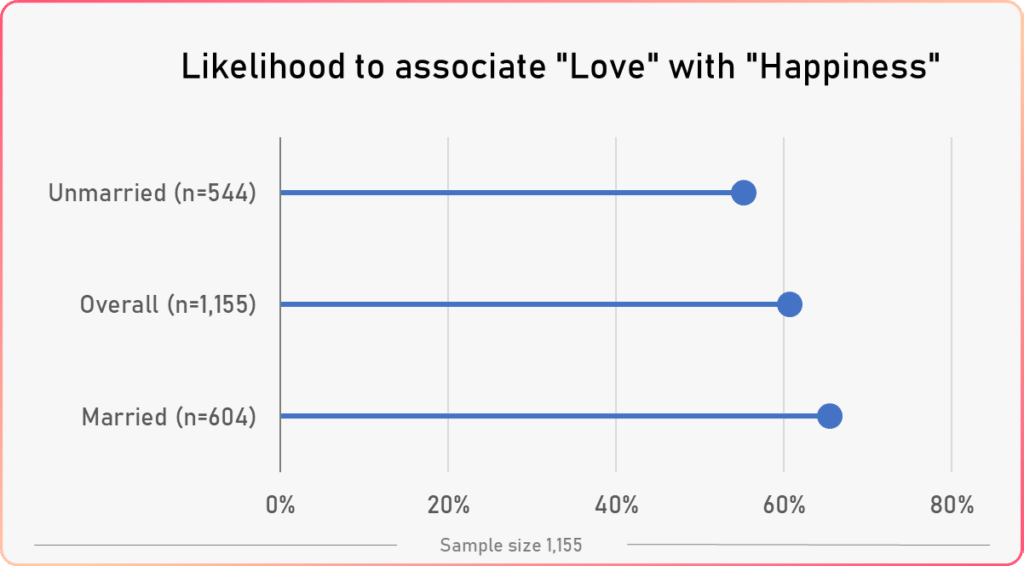
The same difference was found between married and unmarried people when it comes to associating sex with happiness.
Of the 604 married respondents, 16.4% associated the words “Sex” and “Happiness” with each other. Only 13.6% of the unmarried respondents made the same word association.
Married people are 20% more likely to associate “Sex” with “Happiness” than unmarried people.
This difference is visualized in the chart below.
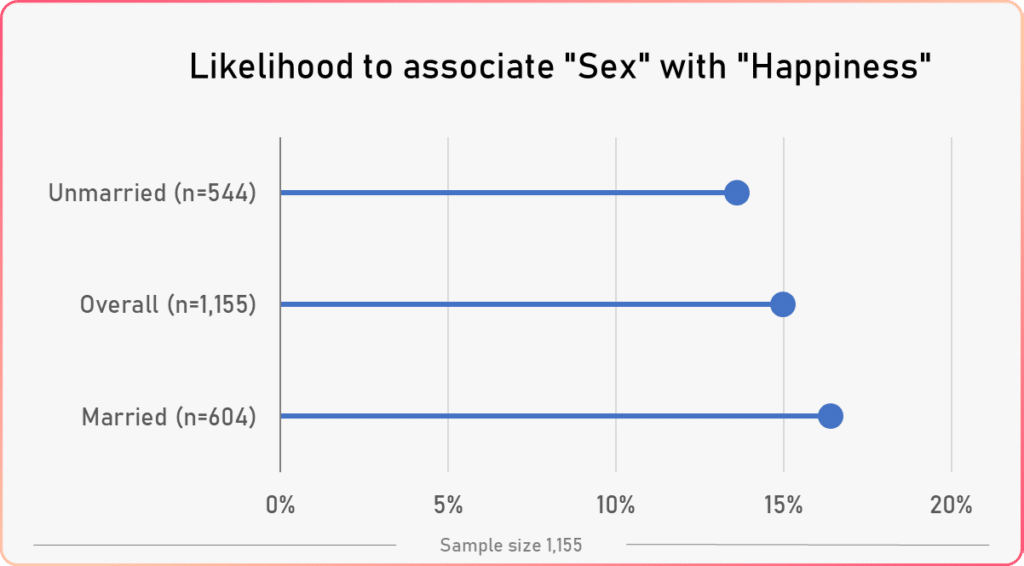
This implies that the importance of sex and love for happiness only increases as a person gets married. An interesting survey was performed by Cosmopolitan that sheds a little light on how marriage affects the sex lives of couples. One of the findings was that married couples tended to have sex less frequently.
Perhaps it’s about quality versus quantity. Our study indicates that married couple associate sex with happiness more often than unmarried couples. So even though married couples may spice things up less often, it’s only getting more important for their happiness.
Does marriage lead to less freedom?
What about the negative differences? What words did married people associate less with happiness?
The answer: “Freedom and independence” and “Purpose in life”.
Of the 604 married respondents, only 29.0% associated the words “Freedom and independence” and “Happiness” with each other. On the other hand, 37.3% of the unmarried respondents made the same word association.
Married people are 22% less likely to associate “Freedom and independence” with “Happiness” than unmarried people.
This difference is visualized in the chart below.
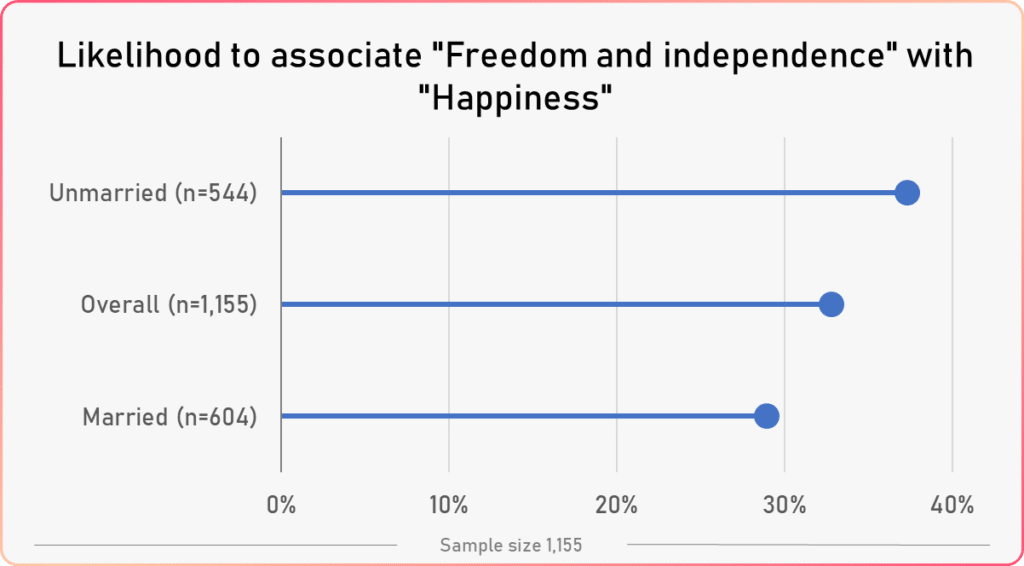
What about “Purpose in life”?
Of the 604 married respondents, only 27.6% associated the words “Purpose in life” and “Happiness” with each other. On the other hand, 41.0% of the unmarried respondents made the same word association.
Married people are 33% less likely to associate “Purpose in life” with “Happiness” than unmarried people.
This difference is visualized in the chart below.
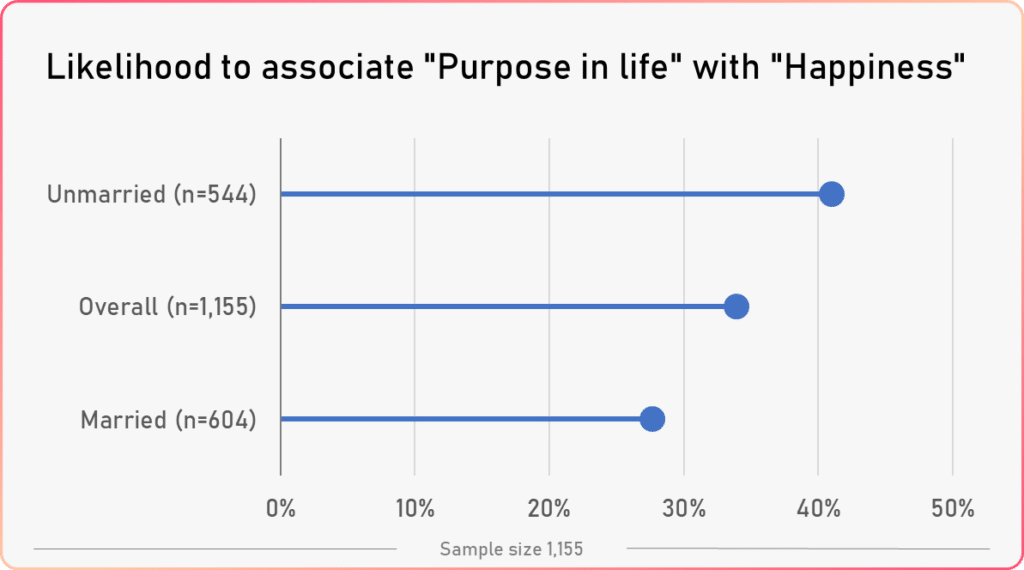
This suggests that by getting married, a person is more likely to share his or her freedom. As a result, your lifepath is intertwined with that of your partner, which may reduce the importance of your own purpose in life.
What about having kids?
Having kids changes your life. It’s often said that having kids is like being on a rollercoaster ride, where highs are often followed by lows. We were excited to see how this would influence how people would describe happiness without being able to actually use the word “Happiness”.
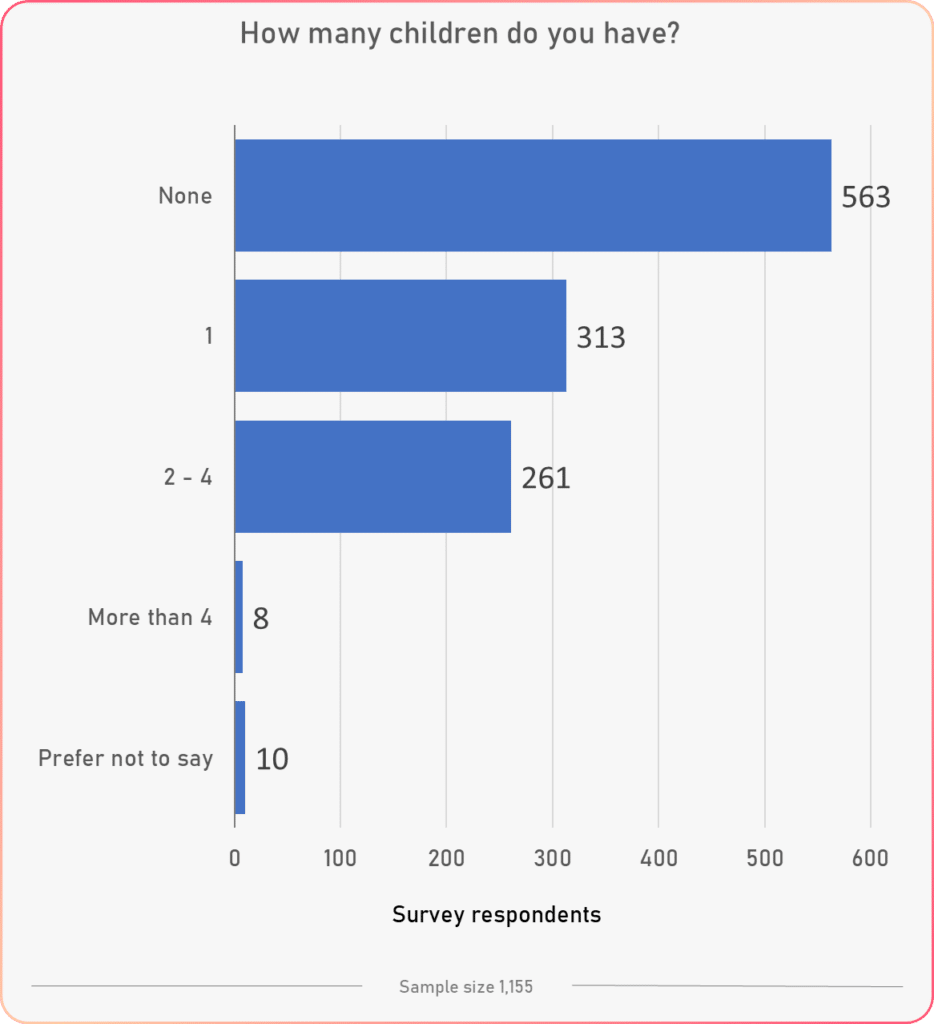
We divided the respondents into 2 groups:
- Parents: n=593
- Non-parents: n=563
Interestingly, we found a clear difference in happiness ratings between parents and non-parents.
Our survey found that parents were 8% happier on average. The average happiness rating of a parent was 7.46, as opposed to an average rating of 6.90 for a non-parent.
How does being a parent impact the definition of happiness for the average respondent?
Happiness equals family for those who have kids
By becoming a parent, you create a family for yourself. This naturally results in a higher importance of family for your happiness. This is in line with the data from our survey.
Out of the 593 parents in our survey, 327 people (55.1%) associated the words “Family” and “Happiness” with each other. For the non-parents, this ratio dropped to 41.2%.
People with kids are 38% more likely to associate “Family” with “Happiness” than people without kids.
This difference is visualized in the chart below.
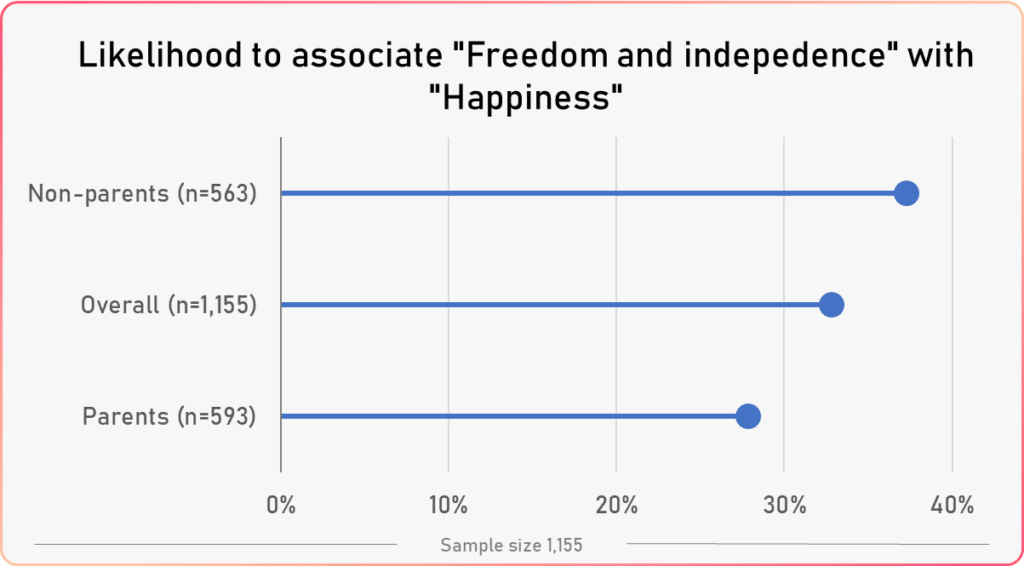
Do kids take away your freedom to do what you want?
Parents have the important responsibility of raising a kid. We expected this would result in some interesting changes in our word association data.
We found that having kids and getting married have a similar impact on our definition of happiness.
By having kids, our definition of happiness is less likely to include the words “Freedom and independence” and “Purpose in life”.
Of the 593 parents, only 27.8% associated the words “Freedom and independence” and “Happiness” with each other. On the other hand, 37.3% of the non-parents made the same word association.
By having kids, we’re 25% less likely to associate “Freedom and independence” with “Happiness”.
This difference is visualized in the chart below.
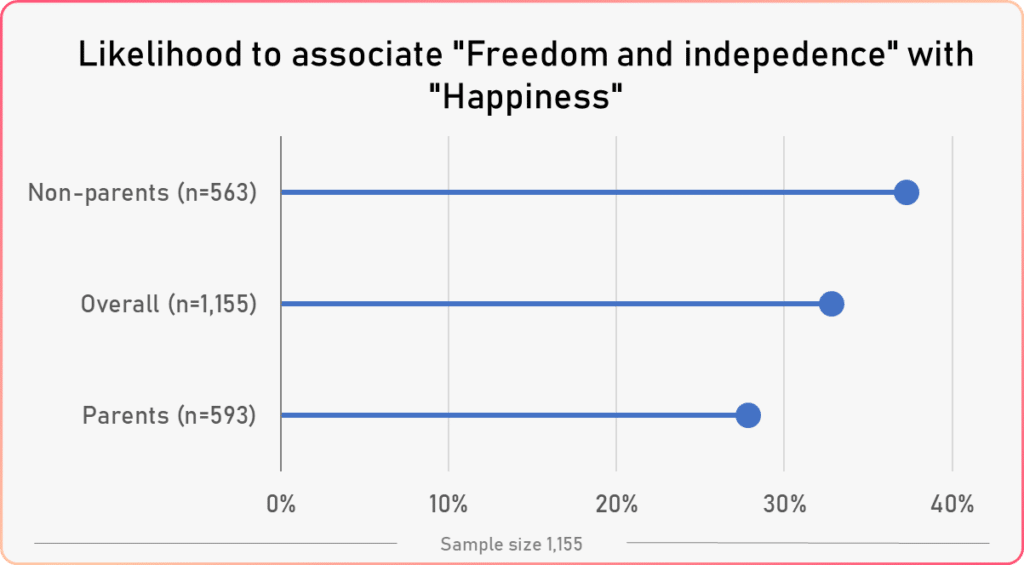
What about “Purpose in life”?
Out of the 593 parents in our survey, 157 people (26.5%) associated the words “Purpose in life” and “Happiness” with each other. For the non-parents, this ratio increased to 40.7%.
Parents are 35% less likely to associate “Purpose in life” with “Happiness” than non-parents.
This difference is visualized in the chart below.
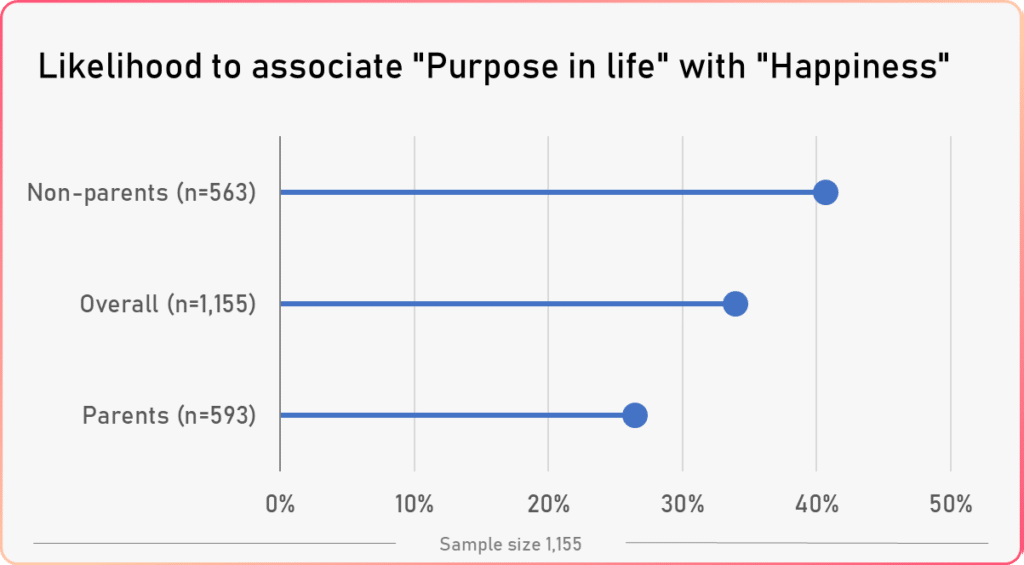
Most people think of their children as making their lives more fulfilling, but what do existing studies say? This study looked at 1.8 million Americans and found no real significant difference in happiness between parents and non-parents. The study states that parents experience more daily joy and more daily stress than nonparents. In other words, the happiness of parents may be similar to that of non-parents, but it’s simply less stable.
Methodology
If you’re looking for more information on how the study was performed, this article provides an overall introduction to this study. It also includes links to other result articles that are relevant to this study.
Want to know more details? Like who was surveyed, what are the demographics of the respondents, and how the study was performed? Here is a link to a document that explains it all (opens in a new window):
Closing words
Men find sex to be more important for their happiness when compared to women. This is the result of a word-association study amongst 1,147 male and female respondents.
What did you think of these results? Let us know in the comments below!

